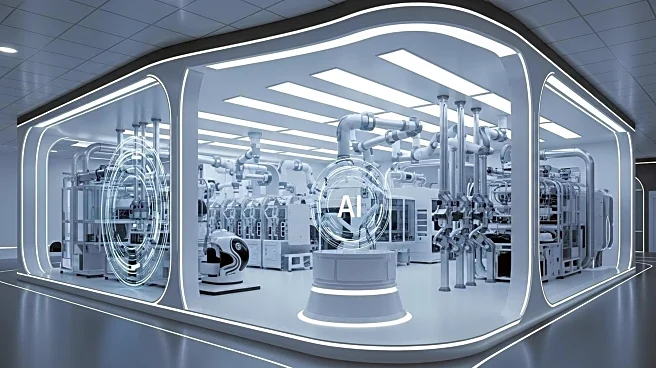What is the story about?
What's Happening?
Gilead Sciences is undertaking a significant investment initiative, committing $32 billion over five years to develop AI-enabled pharmaceutical facilities in the United States. The first of these facilities, a five-story, 182,000 square-foot AI research hub, is being constructed at the company's headquarters in Foster City, California. Scheduled to open in 2026, this facility will focus on oncology and inflammation research, employing advanced technologies such as autonomous robots, augmented reality, and digital twins. The initiative includes the establishment of two additional high-tech research and production facilities, along with the refurbishment of three existing manufacturing sites. Gilead aims to create approximately $43 billion in economic value through capital investment and job creation, while delivering over 10 new transformational medicines by the end of the decade.
Why It's Important?
This investment by Gilead Sciences represents a substantial commitment to advancing pharmaceutical research and development in the United States. By integrating AI and other cutting-edge technologies into its operations, Gilead is positioning itself as a leader in the biopharma industry, particularly in the fields of biologics and small molecules. The economic impact of this initiative is significant, with the potential to create thousands of jobs and stimulate growth in the US biopharma sector. Furthermore, the development of new medicines could have profound implications for patient care, offering innovative treatments for complex diseases such as cancer and inflammatory conditions.
What's Next?
As Gilead Sciences progresses with its investment plan, the completion of the Foster City facility is expected by the end of 2026. The company will continue to develop additional research and production sites, enhancing its capabilities in biologics and other areas. Stakeholders, including industry leaders and policymakers, will likely monitor the impact of these developments on the US biopharma landscape. The success of Gilead's initiative could influence other pharmaceutical companies to adopt similar strategies, further integrating AI and advanced technologies into their operations.
Beyond the Headlines
The integration of AI into pharmaceutical research and manufacturing raises important ethical and regulatory considerations. As AI-driven processes become more prevalent, ensuring the safety and efficacy of new treatments will be paramount. Additionally, the use of AI in drug development may prompt discussions about data privacy and the ethical use of patient information. Long-term, Gilead's investment could contribute to a shift in the pharmaceutical industry towards more sustainable and technologically advanced practices.
















